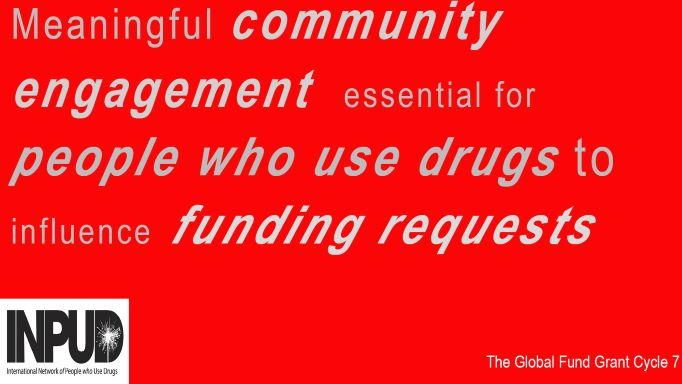Meaningful community engagement is essential for people who use drugs to influence funding request – Global Fund Grant Cycle 7 Guide
The Global Fund Strategy 2023-2028 places community leadership at its front and centre. To achieve this, it promotes investments in community-led responses including community-led monitoring. It also highlights the need to increase funding for community-led organisations, particularly those led by key populations.
The Global Fund has put a new emphasis on meaningful community engagement. This is where the role of communities is consistently and continuously acknowledged in decision making and processes, and where the communities’ unique expertise, perspectives and lived experiences are sought and valued.
In order to increase accountability, transparency, and opportunities for community engagement across the grant cycle the Global Fund has introduced in its newly published Community Engagement guide the three ‘minimum expectations for community engagement’.
- Minimum Expectation 1: The funding request development must include transparent and inclusive consultations with populations most impacted by HIV, TB, and malaria, across gender and age.
- Minimum Expectation 2: To further their involvement in oversight, community and civil society representatives in the CCMs must have timely access to information on the status of grant negotiations and any changes to the grant.
- Minimum Expectation 3: Community and civil society representatives on the CCM have timely access to information on programme implementation.
Funding Priorities of Civil Society and Communities Most Affected by HIV, Tuberculosis and Malaria
Countries are now required to submit a separate document attached to the funding request called “Funding Priorities of Civil Society and Communities Most Affected by HIV, Tuberculosis and Malaria.” This mandatory Annex aims to capture a maximum of 20 priority recommended interventions from the perspective of civil society and communities most affected by the three diseases.
Focus on community-led responses
The Global Fund explicitly recommends that countries’ funding proposals support achievement of the 2021-2026 Global AIDS Strategy. The Strategy includes the ‘30–60–80 targets’ expressing the percent of services that should be delivered by community-led organisations. These are:
- 30% of testing and treatment services should be delivered by community-led organisations.
- • 60% of the programmes to support the achievement of societal enablers should be delivered by community-led organisations.
- • 80% of service delivery for HIV prevention should be delivered by community-led organisations.
The role of communities is also emphasised in the World Health Organisation’s (WHO) new Consolidated guidelines on HIV, viral hepatitis and STI prevention, diagnosis, treatment and care for key populations.
Read INPUD’s briefings on the Global AIDS Strategy 2021-2026 and the 2021 Political Declaration on HIV and AIDS to learn more about targets for people who use drugs that your countries have committed to meet.
